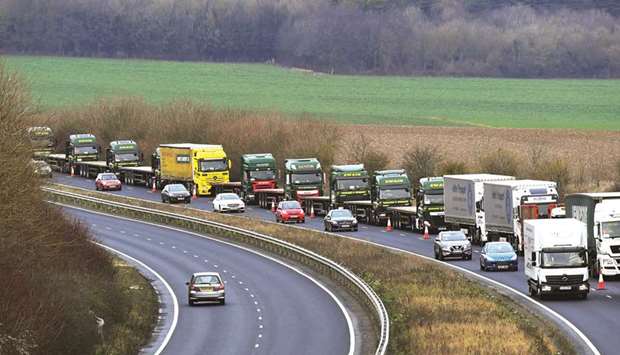A convoy of nearly 90 trucks yesterday rolled through the southeast countryside to Britain’s main port to continental Europe in a government test-run for a potentially chaotic Brexit that was mocked as a farce by opponents of the split.
Prime Minister Theresa May is trying to force her Brexit deal through parliament but lawmakers are expected to reject it.
If so, business chiefs and investors fear the world’s fifth-largest economy will leave the European Union at 2300GMT on March 29 without an agreement on their future relationship.
With parliament deadlocked, the ultimate destination of the Brexit project remains unclear.
Possible outcomes range from another referendum on European Union membership to a disorderly departure with no deal.
May’s government has repeatedly warned that a ‘no deal’ will lead to severe economic disruption, and yesterday’s exercise was part of preparations to ensure essential supplies can keep flowing through Dover, Europe’s busiest ferry port.
The transport ministry said it was testing Manston airfield as a holding facility for lorries and traffic congestion on Kent roads in the event of disruption at the border.
Setting off from Manston, 87 trucks drove the 32kms to Dover and back again.
They then drove again to Dover.
Hiring the lorries cost £48,950, the transport ministry said.
The ‘war game’ was criticised by lawmakers as a waste of time and money and mocked on Twitter as “a fake traffic jam... to show the EU we are ready for no deal”.
Britain’s Road Haulage Association (RHA) said the trial was too little, too late and would need to be repeated to properly stress-test the management of thousands of lorries.
“Less than a hundred lorries is a drop in the ocean compared to the more than 10,000 that go to the channel ports every day,” said Charlie Elphicke, a Conservative lawmaker for Dover.
“Sending lorries across Kent on a wild goose chase to Manston airport and then to the port of Dover by small and winding, often single track ‘A roads’ through Kent villages is not the right plan.”
Dover has been Britain’s most important gateway to Europe since Roman times and the port now handles 17% of the United Kingdom’s goods trade.

A line of lorries is seen in Kent yesterday during a trial between disused Manston Airport and the port of Dover of how the roads will cope in case of a u201cno-dealu201d Brexit.
